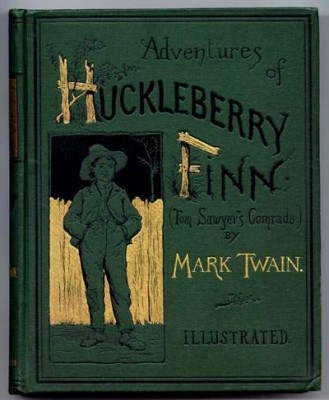 A private high school's decision to pull Mark Twain's The Adventures of Huckleberry Finn from an 11th grade American literature curriculum has generated national headlines, proving that the classic novel can still generate considerable controversy.
A private high school's decision to pull Mark Twain's The Adventures of Huckleberry Finn from an 11th grade American literature curriculum has generated national headlines, proving that the classic novel can still generate considerable controversy.
In a letter to the Friends' Central School, the National Coalition Against Censorship (NCAC)argues that the reasons the school is citing for removing the book only underscore the reasons Huck Finn should be taught. The letter is co-signed by American Booksellers for Free Expression, the
Comic Book Legal Defense Fund and the Association of American Publishers.
—David Bradley
The book, which was to be taught alongside the Narrative of the Life of Frederick Douglass, was removed from the curriculum after a group of students said it made them uncomfortable. A letter to parents stated that the administration had “come to the conclusion that the community costs of reading this book…outweigh the literary benefits.”
There is no doubt that Huck Finn is, in the words of one scholar, "a hard book to read and a hard book to teach." But there is also no doubt that it is a classic work of American literature. At a time of difficult and sometimes polarizing conversations about race, it is understandable that a novel which repeatedly uses a highly offensive slur would generate discomfort. But does the discomfort caused by the language or the ambiguities of the novel’s narrative outweigh the value of teaching the book? Literary scholars and acclaimed authors have for years recommended the book precisely because of the difficult questions it provokes. As Nobel Prize Laureate Toni Morrison wrote, "The brilliance of Huckleberry Finn is that it is the argument it raises.”
The letter commends the school for encouraging students to "stand up for what they believe” and "peacefully transform the world.” But transforming the world requires confronting its contradictions and historical burdens – especially as they are encoded in the nation’s literary canon. As novelist and PEN/Faulkner Award winner David Bradley famously put it,
Huckleberry Finn should be taught because it is a seminal and central text in White American Literature. Huckleberry Finn should be taught because it is a seminal and central text in Black American Literature. Huckleberry Finn must be taught because it is a specific point of intersection between these two American Literatures.
The letter urges the school to reconsider its decision, a move that could help teach students "that the discomfort of living in a society where racial tensions persist will not be resolved by the banishment of literary classics from the classroom."
Read the full letter below, click here for full-screen view.
[scribd id=293556313 key=key-HAZhycVrlfCdkBN040KX mode=scroll]


